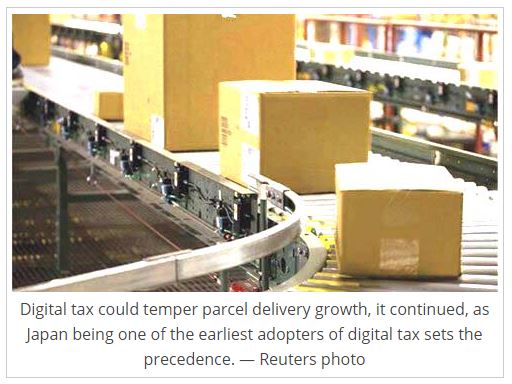Malaysia: Digital tax may impact parcel delivery logistics
KUCHING: Local authorities looking to implement a digital tax on eCommerce transactions may have indirect impact on logistic players in the form of parcel delivery volume growth.
The research team at Affin Hwang Investment Bank Bhd (AffinHwang Capital) in a special report said Malaysia was not alone with conventional tax mechanisms falling behind the emerging digital economy.
It added that a digital tax would shore up much needed tax revenue collections and level business competitiveness.
“In our interest, digital tax does not apply to imported physical goods, which is already levied. However, it could apply to online market operators such as the likes of Lazada, 11street and Shopee, indirectly impacting eCommerce volume, ultimately trickling down to the parcel delivery operators,” it said in a note yesterday.
Digital tax could temper parcel delivery growth, it continued, as Japan being one of the earliest adopters of digital tax sets the precedence.
It saw that Japan’s tax treatment was a consumption tax rate of eight per cent on all eCommerce transactions delivered by foreign business customers, levelling the playing field to Japanese businesses.
“Thus, Japan’s ecommerce revenue growth took a step down in 2015 and 2016 growing 7.6 and 9.9 per cents respectively against the four-year historical average of 13.3 per cent,” it said.
“It coincided with the implementation of digital tax in late 2015. Depending on the quantum and extent of the digital tax implemented by Malaysian authorities, it could very well impact parcel delivery volume growth which has been growing at a healthy four-year cumulative annual growth rate (CAGR) of 24.9 per cent.”
The research firm saw that digital tax does not apply to imported physical goods, which is levied at a range from two to 60 per cent in Malaysia.
“In the broadest sense, it only applies to digital services such as listing advertisement services, movie and music streaming services, overseas consultancy and marketing suppliers including IT, accounting and marketing,” it said.
“Therefore, movie and music streaming services including Netflix and Spotify could be taxed. Digital tax could apply to online market operators such as the likes of Lazada, 11street and Shopee and Zalora as well.
“For instance, the European Union proposed a three per cent tax on digital revenue. Should a similar tax mechanism apply to Malaysian digital services, it would indirectly impact eCommerce volume.
“Intermediary nature of online market operators suggests that any form of digital tax would likely be passed on to the consumer, impacting logistics trade volume.”
Despite the parcel delivery segment growing at a tremendous pace, AffinHwang Capital believed the industry could be headed for one of its most trying periods.
“The factors underpinning our conjecture include: Over the past year, parcel service license holders issued by the Malaysian Communications and Multimedia Commission (MCMC) peaked at an all-time high at 128 licenses.
“This includes online market operator, Lazada, establishing its own parcel delivery. While it is asset heavy, Lazada Express captures the attractive densely populated inner KL area, leaving less attractive delivery networks to the other third party delivery parcel operators.”
Fierce competition in the parcel delivery space that is unlikely to dissipate over the near term was most disconcerting to AffinHwang Capital.
“An all time high parcel delivery license holders coinciding with a recent influx of capex from existing public listed companies, including GD Express, CJ Century and Tiong Nam is likely to burden the
industry over the near term,” it opined.
Source: http://www.theborneopost.com/2018/10/23/digital-tax-may-impact-parcel-delivery-logistics/


 Thailand
Thailand




